- Home
- Michael Newton
How to Write Action Adventure Novels Page 17
How to Write Action Adventure Novels Read online
Page 17
Once again, unless you’re famous or the editors are feeling generous, do not expect to cinch a sale with your proposal. Think of it as an extended query letter, spelling out your plot in more detail and (hopefully) arousing interest in prospective buyers. Chances are, you’ll still need samples of your work to close the deal, which brings us to the nuts and bolts of putting words on paper.
Nuts and Bolts
First, the basics. Please forgive me if I treat you like a rank beginner here. I know you know the rules of manuscript mechanics. It’s the other guy who needs a little help, so just bear with me for a moment, eh?
For openers, your manuscript must absolutely, positively, inescapably be typed. That’s right, you heard me. And before we start to quibble, I assure you, earnestly, that you are not the sole exception to the universal rule. Forget about the glowing compliments you get on penmanship from day to day; the plain fact is that editors won’t read a hand-scrawled manuscript. Case closed. And please don’t tell me that you “just can’t learn to type.” That’s nonsense. Every high school, business school, and junior college in the Western world has typing classes readily available. A writer who won’t type is like a surgeon who’s afraid of knives; either way, you’re in the wrong business.
It doesn’t really matter what you type with—manual, electric, or computer—but your ribbon should be black, your paper white and standard size. The soft pastels and screaming psychedelic shades are great for letters to your friends, but they are simply not professional. Your editors don’t need the thrill, and they will certainly not thank you for the headaches caused by eye strain.
Every manuscript should have a title page, including the author’s name, address, and telephone number, as shown on the next page.
If you’re working with a pseudonym, you type it on the title page, but also indicate your real name in the upper left-hand comer. Don’t concern yourself with notices of copyright at this point. Reputable publishers—like
_______________
John Doe
P.O. Box 333
Los Angeles, CA 90004
(555) 777-1111
BOZO’S GREAT ADVENTURE
by Eric Studly
_______________
those in Writer’s Market—aren’t about to run the risk of litigation for the sake of ripping off your novel. Royalty payments are “misplaced” from time to time, and certain publishers rely too much upon the shopworn promise that “your check is in the mail,” but outright theft of manuscripts is simply not a problem in the industry today.
Starting with the first page of your story, number pages clearly and consecutively, with your last name typed beside the number. Normally, we number pages at the top, in either right- or left-hand corners. The addition of your name—and possibly the title of your manuscript—prevents confusion if the pages should be somehow separated by an editor. Remember that the pages of your manuscript should not be stapled, taped, or bound in any way. Forget about the nifty folders that are used for college research papers. Try a simple paper clip or not, as you prefer, but nothing else.
A chapter heading should be centered, midway down the page. From that point on, your typing must be double-spaced, with ample margins all around. (By double-spaced, I mean two spaces vertically. Do not put double spaces after every word!) It goes without saying—or should—that you type on only one side of a page. What’s that? You heard that Stephen King typed part of ’Salem’s Lot out on the back of milk receipts, in single-space? So what? The President can park all day in loading zones and get away without a ticket, too, but you are ill-advised to follow his example. Make a million bucks or so and earn yourself a name before you get creative with the rules.
I won’t address myself to style, per se, but literacy and familiarity with proper English are essential to the presentation of your manuscript. It doesn’t matter if you’ve always had a mental block for spelling. Buy the biggest dictionary you can find and look up every word you write, if necessary. Scattered typos are forgiven in the heat of combat, but habitual misspellings in a “finished” manuscript are simply inexcusable. The same holds true for sentence fragments, run-on sentences, mistakes in subject-verb agreement, punctuation errors, and assorted other careless blunders. If you have an inkling that your high school English lessons didn’t take, acquire a textbook and review the basics now, before you find yourself embarrassed.
Each submission to an editor or agent needs a cover letter, briefly summing up the contents of your latest package. If you feel it necessary, slip in a polite reminder that the samples were requested back on such-and-such a date. Remember that your correspondent may be dealing with a dozen (or a hundred) writers at the moment, and your month-old query letter may not be the first thing on his mind. A brief refresher couldn’t hint—and it could save your work from accidental relegation to the slush pile.
Mail-wise, you should always send material first-class, in envelopes of proper size and shape. Do not fold manuscripts! If you cannot afford a postal scale, have manuscripts weighed and metered at the nearest post office. Nothing blows your first impression like a sample that arrives with postage due.
Each query letter should include a self-addressed, stamped envelope for the convenience of potential correspondents. Many editors won’t answer, otherwise, so be a sport and buy the extra stamp. Submissions, likewise, should include sufficient first-class postage for return in the event of a rejection. If you don’t want samples back, your cover letter should explain as much, and spare your editor the guesswork.
Publishers consider work at different speeds, depending on a sample’s length, their current work load, and a host of other factors. Holidays may intervene, vacations roll around, and readers call in sick. The listings for assorted publishers in Writer’s Market offer estimates of their response time, but the operative word is estimates. If Spiffy Books reports on manuscripts “within two months,” you may expect the actual response time to be somewhat longer. Give them twice the average time, and slip a gentle query in the mail if there has still been no response. Forgo the histrionics, threats, and accusations. Never pout on paper. You’re supposed to be a pro, and pros don’t pride themselves on making enemies. (With ever-shifting personnel, your nemesis from Spiffy Books may wind up running Doubleday or Random House a year from now, and you can bet that he’ll remember everyone who’s hassled him along the way.) Assuming that your follow-up’s ignored, dispatch a final letter—certified, with a return receipt—withdrawing your material. Retain a copy of the letter for your files, along with the receipt, and try another publisher.
“We’re Sorry, but Your Story Doesn’t Meet Our Present Needs”
Rejection comes to every author in his turn, and you should be prepared to take bad news in stride. Most publishers employ form letters to dispose of unsolicited material. Do not expect critiques with your rejection slips. The average line refers to manuscripts that “do not meet our needs [or fit our schedule] at the present time.” You never really know if anybody’s read your work or not, but either way, you’ve been turned down. Accept it, and move on.
Remember, first and foremost, that rejection speaks to your material and not to you. Despite their fabled egos, working writers don’t survive for long if they insist on treating each rejection as a personal affront. The industry is rife with horror stories based on angry phone calls, death threats, post cards scrawled in blood, but writers who develop reputations for irrational behavior quickly find themselves without an audience. The bad news travels fast, believe me, and there’s simply too much competition in the marketplace for editors to waste their time on lunatics.
(A common gripe concerns the use of third- or fourth-class postage to return a manuscript, when first-class postage was provided by the author. Angry writers bitch and moan about their “loss,” suspecting dark conspiracies, and what’s the point? Okay, I grant you Spiffy Books may owe you fifty cents, but let’s get real. We’re not exactly talking life-and-death here. Shine it on, and cl
ear the mental decks for something more worthwhile—like writing.)
Don’t become discouraged by rejection. Polish up your manuscript as best you can, and turn your mind to other projects while it makes the rounds. If someone offers helpful criticism in the meantime, listen carefully and try to put your pride on hold. (Remember, there’s at least an outside chance they may be right!) Don’t even think about self-publishing in genre fiction. Competition over shelf space is intense, and you will never place a book without assistance from a publisher who has his own distributors. An action writer needs his head examined if he tries to do the job himself.
Blood and Money, or the Business Side of Art
Successful authors may be artists, but they’re also businesspeople who depend on writing for their daily bread and butter. Literary agents, lawyers, and accountants handle many of the working details, but a conscientious pro will take some time to learn the ropes. You may not have an agent, lawyer, or accountant, meaning that you’ll have to take the burden on yourself. It’s no great challenge, and it can be fascinating, if you know your job before you start.
The most important part of any business is the money. Publishers traditionally offer an advance against prospective royalties, meaning that you get some cash up front, deducted from your earnings later, once your book has gone on sale. (Example: If your publisher advances you $2,000 against royalties of six percent on a book retailing for $3.95, you must sell 8,333 books before you pay off the advance and start earning royalties.) Some contracts call for refunds of advances if a book does not break even, meaning that you may be forced to ante up some cash a year or two downstream. Whenever possible, hold out for nonrefundable advances when negotiating contracts with a publisher.
If you break in with series work, you may be dealing with a “work-for-hire” agreement. Basically, this makes you an employee of the publisher, without a vested interest in the series or its characters, which are created, owned, and packaged by the publishers. The pay on work-for-hire agreements varies widely, some including royalties, but you definitely won’t be given public credit for your work (and may be forced, by contract, to maintain a masquerade of confidentiality). You will not share in any sale of movie, television, or dramatic rights, and any royalties provided in your contract may be limited to predetermined sums.
Keep records of your income and expenses for the tax man. Bear in mind that writers, for the most part, are considered to be self-employed; familiarize yourself with all the rules concerning estimated taxes, self-employment tax, home offices, and other regulations handled by the I.R.S. When you negotiate a contract on your own, be conscious of your rights, responsibilities, and any penalties for nonperformance binding either side. It would require another book to cover all the fine points of the business. Fortunately, several are available. I recommend the following: Leonard duBoff’s The Law (in Plain English) for Writers; Richard Balkin’s How to Understand and Negotiate a Book Contract or Magazine Agreement; and Bruce Henderson’s How to Bulletproof Your Manuscript.
With practice and some preparation, you should have the business side of writing well in hand. Be cautious, use your common sense, and understand all documents before you sign. Remember that a careless businessman who loses money on a deal has no one he can blame except himself.
12. The Payoff
We’ve come full circle now, from sorting out ideas and shaping plots to putting them on paper, sending them away for editorial review. There’s nothing you can do to speed things up, once you’ve delivered samples to the postman, and I recommend you have another project waiting in the wings to occupy your mind. Above all else, you must learn patience, realizing that you’ve reached the stage where you begin to pay your dues.
Your goal, from this point on, is getting published. Writing, as a business, has a lot in common with those advertisements in the daily classifieds: experience may not be crucial, but it’s certainly preferred. Accumulating “credits” is your first priority, and at the risk of sounding crass, I will suggest you take them as they come.
A friend of mine, with more than fifty books behind him, used to spice his early queries with a mention of the fact that he had written frequently for major periodicals. He didn’t mention that his “published work” consisted of assorted letters to the editorial department of his local paper … and the buyers never asked. The plain fact is that editors are more inclined to read your work if someone else has had the faith to publish you before.
Times change, and each new round of authors have to prove themselves in different ways. For thirty years or so, until the latter 1950s, break-ins through the pulps were all the rage. The 1960s saw a shift toward paperback pornography, and many of our leading genre authors cut their literary teeth on kinky sex. Today—good news!—your odds of breaking in with more “legitimate” material have been improved by a resurgence in the fields of action, Westerns, mystery, and horror.
Breaking in means starting at the bottom, income-wise and every other way. You won’t be pulling down six figures in advance, your books won’t be promoted in the same way Stephen King’s are laid before the public, and the chances are you won’t be autographing copies of the New York Times best-seller list until you’ve been around the track and learned the business inside out. When you can tell a story in your sleep and have the readers coming back for more, you’ll know that you’ve arrived—and I suspect your editors will know it, too.
In short, there’s really no such thing as “overnight success,” in this or any other business. Sure, I’ve heard the stories: Mr. X from Middletown pecks out a novel, working nights and weekends, while he labors nine-to-five at some depressing, dead-end job, and presto! Instant millionaire. Before he has a chance to change his socks, he’s sitting on the Johnny Carson show and hawking movie rights to books he hasn’t even written yet.
Okay, it happens. And they still discover movie stars behind the register at K-Mart, but for every documented miracle there are a thousand ordinary people working overtime to learn their trade. In practice, writers have to build their reputations brick by brick, like everybody else. The only real exceptions seem to come with famous names attached, like Margaret Truman, Thomas Tryon, Gary Hart, and William Buckley. Not that all of the above aren’t fine, proficient authors—but it’s safe to say the selling power of their names was instrumental in acceptance and promotion of their novels, first time out.
Before he touched a nerve (and tapped a gold mine) with the Executioner, Don Pendleton had turned out paperbacks like The Olympians, Revolt, The Guns of Terra Ten, and The Truth About Sex. Today, with Big Mack Bolan more or less behind him, Don is going strong with characters like Ashton Ford, from Warner Books, and he has recently broken into hardcover mysteries, with the Joe Copp series.
Ken Follett, currently a wealthy brand-name author, paid his dues for years with titles like The Shakeout, The Big Needle, Bear Raid, and The Secret of Kellerman’s Studio, before cracking the big time with Eye of the Needle and other best-sellers. Many of his older works have lately been reissued, advertised as “early Follett capers,” based upon the sure-fire selling power of his name. One hand does wash the other, after all. Without the early novels, chances are that Follett never would have struck it rich. Today, his recent works bestow new life upon the old.
Martin Cruz Smith took the world of popular fiction by storm with Nightwing, following up with the best-sellers Gorky Park and Stallion Gate a few years later. Overnight success? Not quite. Before he penned his gruesome tale of vampires vs. Navahos, Smith had compiled a long track record with titles like Gypsy in Amber, The Indians Won, Nuplex Red, and The Midas Coffin. Don’t feel too embarrassed if you missed them; most were published under pseudonyms and sank without a major ripple in the marketplace.
Consider Stephen King. Another “overnight success,” with Carrie, King had actually been writing more or less nonstop for twenty years, racking up his first sale seven years before the grim biography of Carrie White transformed his name into a hous
ehold word. It was a near thing, even so: Disgusted by rejection slips, King had consigned his breakthrough novel to the trash can, but his wife retrieved it and insisted that he finish. Modern horror has never been the same.
My own experience is similar, albeit more subdued. I spent a decade writing fifty-seven books—nonfiction, Westerns, mysteries, and action yams—before I could afford to dump a dead-end teaching job and write full-time. There were occasions when I wondered If The Break would ever come, but paying dues can have its own rewards./The opportunity to live your fantasies on paper. Paychecks, when they filially arrive. The lift you feel (come on, admit it!) every time you see your name in print.
It should not be supposed that the pursuit of “credits” justifies an author in producing trash disguised as fiction. Granted, there will always be assorted hacks around the fringes of the industry, existing hand to mouth, but none of them deserve to prosper, and the vast majority will never rise above their roots, habitually grinding out the kind of manuscripts that give genre fiction a bad name. If you aspire to hackdom, I apologize for taking up your time. If you intend to make your work the best that it can be, you need to brace yourself. There will be work involved.
Make no mistake, the full-time writer’s life can be a very pleasant one. Your hours are your own—at least, they are until a deadline rears its ugly head—and you can pace yourself without a supervisor breathing down your neck and scowling when you want to break for coffee. If you feel the urge to “get away,” there won’t be anybody standing by the time clock with a pink slip in his hand. Your lifestyle, in comparison with others stuck in nine-to-five routines, may offer a unique amount of freedom, room to ramble, time and space to let your secret fantasies unwind.

 Blaze! Night Riders
Blaze! Night Riders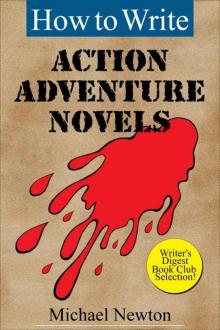 How to Write Action Adventure Novels
How to Write Action Adventure Novels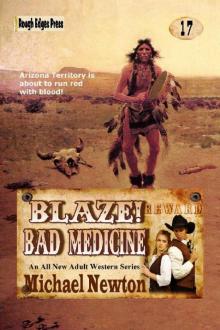 Blaze! Bad Medicine
Blaze! Bad Medicine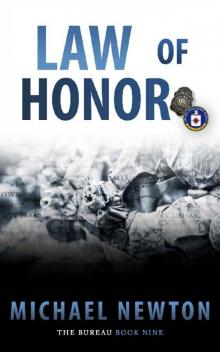 Law of Honor
Law of Honor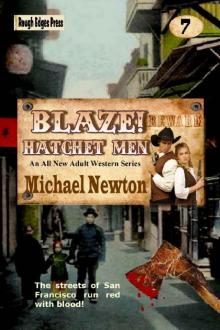 Blaze! Hatchet Men
Blaze! Hatchet Men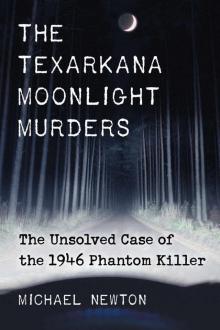 The Texarkana Moonlight Murders
The Texarkana Moonlight Murders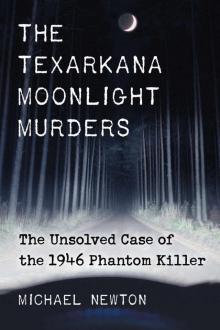 The Texarkana Moonlight Murders: The Unsolved Case of the 1946 Phantom Killer
The Texarkana Moonlight Murders: The Unsolved Case of the 1946 Phantom Killer